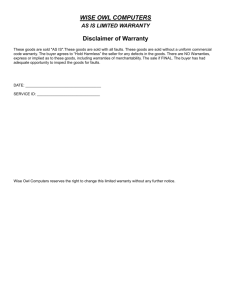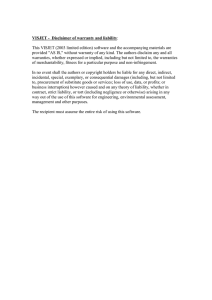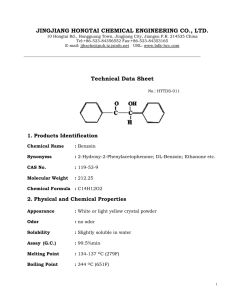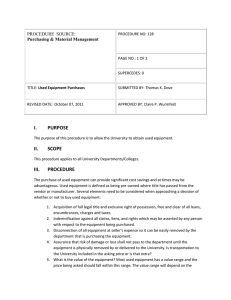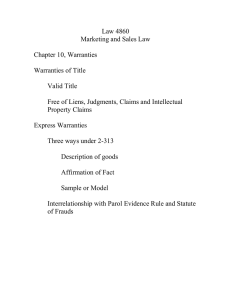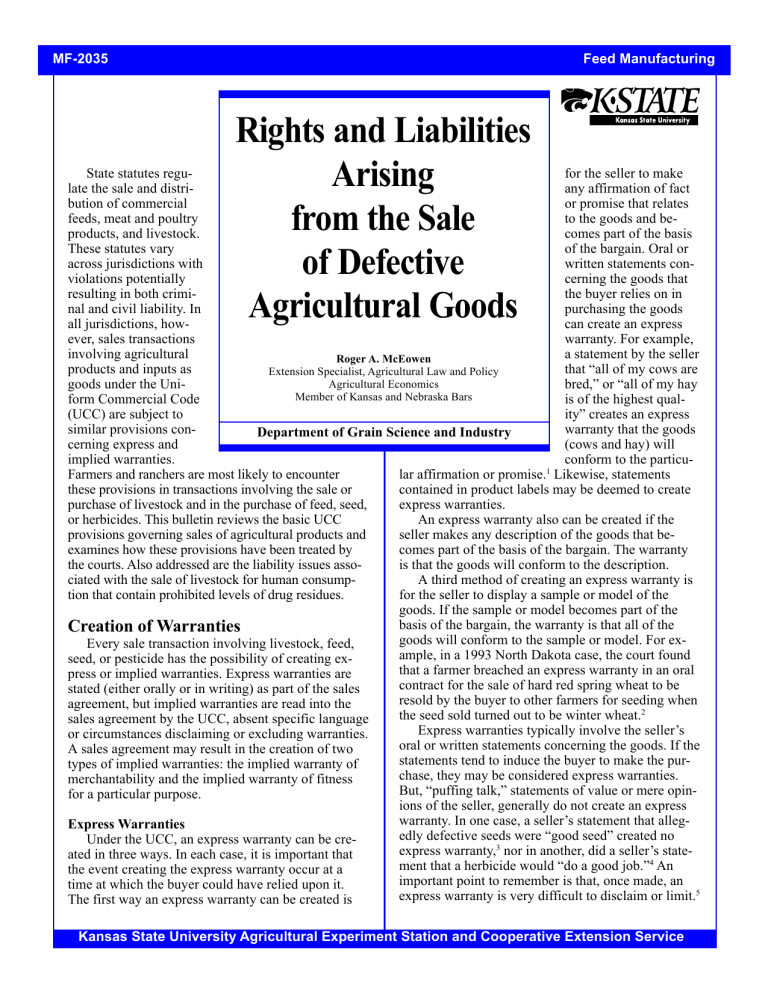
1
MF-2035
Feed Manufacturing
Rights and Liabilities
Arising
from the Sale
of Defective
Agricultural Goods
for the seller to make
State statutes reguany affirmation of fact
late the sale and distrior promise that relates
bution of commercial
to the goods and befeeds, meat and poultry
comes part of the basis
products, and livestock.
of the bargain. Oral or
These statutes vary
written statements conacross jurisdictions with
cerning the goods that
violations potentially
the buyer relies on in
resulting in both crimipurchasing the goods
nal and civil liability. In
can create an express
all jurisdictions, howwarranty. For example,
ever, sales transactions
a statement by the seller
involving agricultural
Roger A. McEowen
that “all of my cows are
products and inputs as
Extension Specialist, Agricultural Law and Policy
Agricultural Economics
bred,” or “all of my hay
goods under the UniMember of Kansas and Nebraska Bars
is of the highest qualform Commercial Code
ity” creates an express
(UCC) are subject to
warranty that the goods
similar provisions conDepartment of Grain Science and Industry
(cows and hay) will
cerning express and
conform to the particuimplied warranties.
lar affirmation or promise.1 Likewise, statements
Farmers and ranchers are most likely to encounter
these provisions in transactions involving the sale or
contained in product labels may be deemed to create
purchase of livestock and in the purchase of feed, seed,
express warranties.
or herbicides. This bulletin reviews the basic UCC
An express warranty also can be created if the
provisions governing sales of agricultural products and
seller makes any description of the goods that beexamines how these provisions have been treated by
comes part of the basis of the bargain. The warranty
the courts. Also addressed are the liability issues assois that the goods will conform to the description.
ciated with the sale of livestock for human consumpA third method of creating an express warranty is
tion that contain prohibited levels of drug residues.
for the seller to display a sample or model of the
goods. If the sample or model becomes part of the
basis of the bargain, the warranty is that all of the
Creation of Warranties
goods will conform to the sample or model. For exEvery sale transaction involving livestock, feed,
ample, in a 1993 North Dakota case, the court found
seed, or pesticide has the possibility of creating exthat a farmer breached an express warranty in an oral
press or implied warranties. Express warranties are
contract for the sale of hard red spring wheat to be
stated (either orally or in writing) as part of the sales
resold by the buyer to other farmers for seeding when
agreement, but implied warranties are read into the
the seed sold turned out to be winter wheat.2
sales agreement by the UCC, absent specific language
Express warranties typically involve the seller’s
or circumstances disclaiming or excluding warranties.
oral
or written statements concerning the goods. If the
A sales agreement may result in the creation of two
statements
tend to induce the buyer to make the purtypes of implied warranties: the implied warranty of
chase,
they
may be considered express warranties.
merchantability and the implied warranty of fitness
But,
“puffing
talk,” statements of value or mere opinfor a particular purpose.
ions of the seller, generally do not create an express
warranty. In one case, a seller’s statement that allegExpress Warranties
edly defective seeds were “good seed” created no
Under the UCC, an express warranty can be creexpress warranty,3 nor in another, did a seller’s stateated in three ways. In each case, it is important that
ment that a herbicide would “do a good job.”4 An
the event creating the express warranty occur at a
important point to remember is that, once made, an
time at which the buyer could have relied upon it.
express warranty is very difficult to disclaim or limit.5
The first way an express warranty can be created is
Kansas State University Agricultural Experiment Station and Cooperative Extension Service
2
Parties to sales contracts should exercise caution
when reducing oral agreements to writing with the
intent of making the written contract the final agreement between the parties. Oral statements may inadvertently be omitted from a later writing, but they
could have served as the basis of the bargain. As
such, an express warranty could have been created
orally, but be eliminated by a subsequent writing
omitting the relied upon oral statements. The most
prudent approach is to ensure that all previously negotiated terms are incorporated into any subsequent
written agreement.
Any representations made by a company, its employees, consultants, or agents pertaining to a product, whether oral or written, can potentially be treated
as express warranties. Thus, an important part of any
loss-prevention program is to closely monitor any
representations made and provide training concerning
appropriate representations.
Implied Warranties
Implied warranties are imposed by law to assure a
fair result and fulfill the buyer’s typical expectations
that an acceptable product is being purchased. There
are two types of implied warranties: the implied warranty of merchantability and the implied warranty of
fitness for a particular purpose.
Implied warranty of merchantability. A warranty of merchantability is imposed on all goods sold
by merchants. The warranty exists even if the seller
made no statements or promises concerning the goods
and did not know of any defect. Merchant-sellers
warrant that the goods they sell are merchantable.
This means the goods will be what they are described
to be and will be fit for the ordinary purposes for
which such goods are used. A merchant is defined as:
“a person who deals in goods of the kind
or otherwise by his occupation holds
himself out as having knowledge or skill
peculiar to the practices or goods
involved in the transaction or to whom
such knowledge or skill may be attributed
by his employment of an agent or broker
or other intermediary who by his occupation holds himself out as having such
knowledge or skill.”6
Courts are divided on the issue of whether a
farmer is a merchant with the outcome depending on
the jurisdiction and the facts of the particular case.
Unfortunately, in many instances, farmers and ranch-
ers cannot know with certainty whether they are merchants without becoming involved in legal action on
the issue.
In Nelson v. Union Equity Cooperative Exchange,7
the Texas Supreme Court ruled that a farmer who sold
cotton and wheat produced on his 1,200-acre farm was
a merchant. The farmer sold all of his production for
each of the previous five years and daily kept abreast
of current market prices and conditions by talking to
grain dealers and listening to the radio.8 Conversely,
the South Dakota Supreme Court in Terminal Grain
Corporation v. Freeman,9 concluded that “the average
farmer…with no particular knowledge or experience in
selling, buying, or dealing in future commodity transactions, and who sells only the crops he raises to local
elevators for cash or who places his grain in storage
under one of the federal loan programs is not a ‘merchant.’” Other jurisdictions have ruled both ways depending on the facts of the particular case.10
In general, courts consider several factors in determining whether a particular farmer is a merchant.
These factors include (1) the length of time the
farmer has been engaged in marketing products produced on the farm; (2) the degree of business skill
demonstrated in transactions with other parties; (3)
the farmer’s awareness of the operation and existence
of farm markets; and (4) the farmer’s past experience
with or knowledge of the customs and practices
unique to the marketing of the product sold.
In order for goods to be merchantable, they must
be goods that:
(a)
Pass without objection in the trade under the
contract description.
(b)
In the case of fungible goods, are of fair average quality within the description (“fair average quality” means goods centering around the
middle range of quality).
(c)
Are fit for the ordinary purposes for which
such goods are used.
(d)
Run, within the variations permitted by the
agreement, of even kind, quality and quantity
within each unit and among all units involved.
(e)
Are adequately contained, packaged, and labeled as the agreement may require.
(f)
Conform to the promises or affirmations of
fact made on the container or label if any.11
In order to recover damages for breach of the implied warranty of merchantability, a buyer must show
the product was defective when it left the seller’s
control and that the defect caused the buyer’s injury.
As expected, much of the focus in cases involving
3
defective agricultural goods centers on whether the
goods are fit for the ordinary purposes for which they
are used. For example, one court has held that corn
containing vomitoxin that caused reproductive problems in pigs was unfit for its ordinary purposes.12
Another court ruled that bean seed was not fit for its
ordinary purpose when the purchaser discovered,
after planting, that the seed was infected with a seedborne bacterial disease.13 This defect, the court held,
invalidated the label provisions that attempted to
disclaim warranties for merchantability and fitness.
Merchantability can also involve the standard of
merchantability in the particular trade. Usage of trade
is defined as “any practice or method of dealing having such regularity of observance in a place, vocation
or trade as to justify an expectation that it will be
observed with respect to the transaction in question.”14 If a product fails to satisfy industry standards,
an implied warranty of merchantability may arise. For
example, one court has held that feed for breeding
cattle normally does not contain the female hormone
stilbestrol because it is known to cause abortions in
pregnant cows and sterility in bulls.15
Even if a particular farmer does not qualify as a
merchant, known product defects must be disclosed
to a potential buyer. Every seller with knowledge of
defects must fully disclose defects that are not apparent to the buyer on reasonable inspection. This duty
arises out of the underlying rationale behind the implied warranty of merchantability, which is to assure
that the buyer is getting what is being paid for, and
the UCC’s requirement that market participants operate in “good faith.”
Implied warranties in livestock transactions.
Historically, the UCC warranty provisions applied to
sales transactions involving livestock.16 However, in
the mid-to-late 1970s, the livestock industry successfully lobbied for an exclusionary provision limiting the
application of implied warranties in livestock sales.17
Some version of the statutory exclusion of implied
warranties has now been adopted in almost one-half
of the states, in particular those states where the livestock industry is of major economic importance.18
The Kansas statute is typical of the modification:
Kan. Stat. Ann. § 84-2-316(3)(d): [W]ith respect
to the sale of livestock, other than the sale of livestock for immediate slaughter, there shall be no implied warranties, except that the provisions of this
paragraph shall not apply in any case where the seller
knowingly sells livestock which is diseased.
Presently, there are no reported decisions interpreting any of the various state statutes. However,
several points merit consideration. First, the exclu-
sion only pertains to implied warranties. Express
warranties can still be made in livestock transactions,
especially those involving breeding livestock. Many
sellers tend to make statements that might rise to the
level of an express warranty in order to induce buyers
to conclude the sale. If such statements induce the
purchase, they create an express warranty that can be
enforced against the seller.
Most state statutory exclusions do not apply in
situations where the seller knowingly sells animals
that are diseased or sick. However, it is likely to be
difficult for a livestock buyer to prove the seller knew
the animals were diseased or sick at the time they
were sold. Under the UCC, a seller “‘knows’ or ‘has
knowledge’ of a fact when the seller has ‘actual
knowledge’ of it.”19 Thus, in order to overcome the
statutory exclusion, the buyer must prove (most likely
by circumstantial evidence) the seller’s actual knowledge regarding the animal’s disease or sickness.
Likewise, under most state statutes, the meaning
of “diseased or sick” is unclear. For breeding animals,
the failure to provide offspring may result from recognizable diseases or from genetic defects that historically have not been considered diseases. It is
uncertain whether the statutory exclusion of implied
warranties applies in circumstances involving genetic
defects. Presently, no court in a jurisdiction having
the exclusion has addressed the issue.20
Implied warranty of fitness for a particular
purpose. A second implied warranty that can arise in
a sales transaction is that the goods are fit for the
buyer’s particular purpose. This warranty arises when
the seller has reason to know of the buyer’s particular
purpose for purchasing the goods and the buyer, in
fact, relies on the seller’s skill or judgment to select
or furnish suitable goods. Unlike the implied warranty of merchantability, the implied warranty of
fitness for a particular purpose can be imposed on any
seller (except for seed and livestock) regardless of
whether the seller is a merchant. This warranty exists
if the facts surrounding the sale are such that the
seller should realize the buyer wishes to utilize the
goods for a particular purpose and the buyer relies on
the seller’s skill and judgment in furnishing suitable
goods for that particular purpose.21 The seller need
not have actual knowledge of the particular purpose
for which the goods are intended or that the buyer is
relying on the seller’s skill or judgment.22 The sale of
specialty feeds is particularly susceptible to a claim
that an implied warranty of fitness for a particular
purpose has arisen. Specialty feeds are typically fed
to animals with special needs, and courts generally
presume that sellers know those needs.23
4
If reliance cannot be clearly established, some courts
have still allowed a damaged buyer to recover. For example, in a Nebraska case24 the plaintiff was a sophisticated buyer with considerable experience in grain and
hogs, and there was little evidence that he relied on the
skill and knowledge of the seller to select the particular
feed corn involved, which happened to be contaminated
with vomitoxin. The court, nevertheless, permitted recovery under a warranty of fitness theory for the death
of the plaintiff’s hogs that died after eating the contaminated corn. Similarly, in Dotts v. Bennett,25 there was no
evidence that the seller had reason to know the buyer
was relying on the seller’s skill and judgment to select
suitable hay. However, in Purina Mills Inc. v. Askins,26
there was evidence the salesman made specific recommendations for the dairy operation upon which the buyers apparently relied.27
A “‘particular purpose’ differs from the ordinary
purpose for which the goods are used....”28 The rationale is that the implied warranty of merchantability
covers basic uses for goods, whereas the implied warranty of fitness for a particular purpose covers a
buyer’s specific use. This does not mean that a sale
contract cannot include both an implied warranty of
merchantability and an implied warranty of fitness for
a particular purpose. If both warranties are created,
any factual issues concerning which warranty was
intended by the parties to apply is resolved in favor of
the warranty of fitness for particular purpose.29
Exclusion or Modification
of Implied Warranties
To disclaim or modify the implied warranty of
merchantability, the seller’s “language must mention
merchantability and in case of a writing must be conspicuous…”30 Thus, an oral disclaimer of an implied
warranty is possible if the word “merchantability” is
used, but for written disclaimers, the disclaiming
language must not be hidden within the written document. However, a disclaimer of an implied warranty
of fitness for a particular purpose must be in writing
to be enforceable.
Section 2-316 specifically provides three ways in
which all implied warranties can be excluded:
(a)
(b)
Unless the circumstances indicate otherwise,
all implied warranties are excluded by expressions like “as is,” “with all faults” or other
language which in common understanding
calls the buyer’s attention to the exclusion of
warranties and makes plain that there is no
implied warranty; and
When the buyer before entering into the con-
tract has examined the goods or the sample or
model as fully as he desired or has refused to
examine the goods, there is no implied warranty with regard to defects which an examination ought in the circumstances to have
revealed to him; and
(c)
An implied warranty can also be excluded or
modified by course of dealing or course of
performance or usage of trade.31
A sale of goods “as is” puts a potential buyer on
notice that there are no implied warranties, unless
additional negotiations between the buyer and seller
indicate the parties intended the goods to be merchantable. In that event, an implied warranty of merchantability may not be excluded by an “as is”
contract clause.32 In 1995, an Illinois court held that
an implement dealer that sold a used tractor to a
farmer limited the scope of its “as is” disclaimer by
making other representations to the buyer.33 While the
purchase order stated the tractor was being sold “as
is,” it also contained a dealer’s check section that
made specific representations as to particular features
of the tractor.
Usually, giving a potential buyer the opportunity
to inspect the goods eliminates the implied warranties
on any defects that could have been reasonably discovered upon inspection. Also, a seller’s relationship
with the buyer, industry practice, or usage of trade
can exclude an implied warranty.
Some states, such as Kansas, prohibit any seller in
a consumer transaction (which includes transactions
involving farmers and ranchers) from excluding,
modifying, or limiting implied warranties of merchantability or fitness.34 Any such limitation is usually considered void unless the buyer knew of the
defect before purchasing and this knowledge became
part of the basis of the sale. The only exceptions are
for sales of livestock for agricultural purposes (as
previously mentioned) and sales of seed for planting.
In seed sale transactions, the Federal Seed Act (FSA)
allows seed sellers to use disclaimers, limited warranties, or nonwarranty clauses in invoices, advertising
or labeling.35 However, the FSA does not permit such
limitations on warranties to be used as a defense in
any criminal prosecution or other civil proceeding
based on the FSA. Thus, seed purchasers may be
faced with label disclaimers limiting liability to the
price of the seed. Courts are split on the validity of
such disclaimers with most courts invalidating them
only if liability results from the seller’s own negligence or intentional violation of the law.36
5
Alternative Theories of Recovery
Revocation of acceptance
If a buyer cannot recover damages relating to the
purchase of goods on a warranty theory, an alternative
may be to attempt to revoke acceptance of the goods.
Under UCC § 2-608, a buyer may revoke acceptance
where the nonconformity substantially impairs the
goods’ value if the acceptance was without knowledge
of the nonconformity, and the acceptance was reasonably induced either by the difficulty of discovery before acceptance or by the seller’s assurances. The
buyer does not have to elect between revocation and
recovery of damages for breach of warranty, but can
pursue either remedy.
If upon tender of delivery by the seller, the goods
do not conform to the contract, the buyer has three
basic options. The buyer may reject all of the goods
within a reasonable time and notify the seller, accept
all of the goods, despite their nonconformance, or accept part (limited to commercial units) and reject the
rest. A buyer rejecting nonconforming goods is entitled
to reimbursement from the seller for any expenses
incurred in caring for the goods.
Nonconformity is a question of fact. In a Vermont
case, contract revocation was permitted where a dairy
cow purchased at auction and represented to be “clean,
good, healthy, ready to be a milker” was, in fact, toothless and unable to eat commercial grain necessary for
lactation.37 Nonconformity was established based on the
difference between the cow’s condition and the contrary
representation. The court allowed the buyer to revoke
and return the cow in return for the purchase price.
As mentioned above, a buyer may reject nonconforming goods if such nonconformity substantially
impairs the contract. A buyer is usually not allowed to
cancel a contract for only trivial defects in goods. In
Hubbard v. UTZ Quality Foods Inc,38 the court upheld
a potato chip manufacturer’s refusal to accept chipping
potatoes from a potato grower because the potatoes
failed to meet color requirements specified in the contract. The potato grower sent samples to the buyer who
rejected the potatoes because the resulting chips did
not meet the required color standard. The potato
grower tested some of the rejected potatoes with a
photo electric refraction tester, and some of the potatoes tested within a range acceptable under the contract. The court found the use of visual testing was the
industry norm and, therefore, the buyer’s failure to
machine test the potatoes was not a breach of the contract. As a result, the court held the failure of the potatoes to satisfy the color requirement as specified in the
contract substantially impaired the contract and justified the buyer’s refusal to accept any of the potatoes.
Strict Liability in Tort
If the seller is unable to pursue a breach of warranty remedy or cannot revoke acceptance, an alternative might be to make a claim based on strict liability
in tort. The difficulty is that an intangible commercial
loss or pure economic loss is ordinarily not recoverable in strict liability. Rather, such losses are normally handled under the UCC rules governing
commercial transactions.
A claim based on strict liability in tort is similar to
a product liability claim for personal injury or property damage caused by defects in the design, manufacturer, production, marketing, labeling, testing,
storing, or packaging of manufacture products. To
obtain a recovery under a strict liability theory, the
plaintiff must establish that (1) the product was defective (and, in most cases, unreasonably dangerous); (2)
the defect was present when the product left the
manufacturer’s control; and (3) the defect was the
proximate cause of the plaintiff’s injury.
Courts usually allow strict liability actions in situations where a product’s defective condition renders it
unreasonably dangerous. However, successful application of product liability rules in livestock sale transactions may be limited because livestock are not
necessarily “products” in the same sense as are manufactured goods. Several courts have addressed the question of whether a live animal can be considered a
product so that an injured plaintiff can maintain a product liability-type action. For instance, one Illinois court
dealt specifically with the issue of whether defective
livestock were products, and held the strict liability
theory inapplicable.39 In that case, the buyer sued the
supplier of gilts infected with bloody dysentery that
were to be used for breeding purposes. Since warranties
had been disclaimed, the buyer attempted to recover on
a product liability theory. The court refused to extend the
strict liability concept to the guilts, in part because they
were not contemplated as “products” under generally
accepted principals of product liability law, but also
because the court believed the purpose of strict liability
would be defeated if it extended to products whose
character were easily susceptible to changes outside
the seller’s control. Likewise, in Kaplan v. C Lazy U
Ranch,40 the court held that a strict products liability
action could not be maintained for injuries sustained from
a fall off a horse because the nature of the horse was not
fixed at the time it left the manufacturer’s or seller’s
control. Similarly, in Anderson v. Farmers Hybrid Co.,41
the court denied a products liability action brought by
two farmers against the suppliers of allegedly diseased
gilts because the nature of the gilts had not been fixed at
the time they left the control of the suppliers.
6
In most cases, for a strict liability theory to be
successful, the product at issue must also be dangerous to an extent beyond that which would be contemplated by the ordinary and reasonable buyer,
consumer or user.42 Typically, the defect must render
the product not merely inadequate, but must also pose
an actual danger to persons or property. In one case
involving the sale of semen, the United States Court
of Appeals for the 5th Circuit, applying Texas law,
was unwilling to find a genetic defect to be unreasonably dangerous.43 The court noted that all semen
could carry defective genes and that an ordinary consumer would know of this possibility.
Similarly, in Purina Mills, Inc. v. Askins,44 the
court indicated that, upon retrial, the plaintiffs would
be required to offer proof that the feed was in a defective condition that rendered it unreasonably dangerous and that the defective condition was a proximate
cause of harm to the cattle, again emphasizing that
strict liability applies where the product is both defective and unreasonably dangerous.45
Liability for Sale of Livestock
Sold for Human Consumption
Containing Prohibited
Drug Residue Levels
Under the Federal Food, Drug, and Cosmetic Act
(FDCA), the government can prevent the introduction
or delivery for introduction into interstate commerce
any food that is adulterated.46 Under the FDCA, food is
defined as “articles used for food or drink for man or
other animals, chewing gum, and articles used for components of any such article.”47 Nothing in the language
of the statute itself explicitly indicates that live animals
raised for slaughter and consumption either are or are
not food or articles used for food within the meaning of
the statute. However, since 1970, the Food and Drug
Administration (FDA) has maintained the offering for
slaughter of live animals, whose edible tissues contain
above-tolerance residues, exposes the offeror to liability for introducing adulterated food into interstate commerce, and has taken action against other purveyors of
live animals in accordance with that position.
The FDCA language is broad enough to hold liable
individuals who did not actually introduce drugs into
livestock. Thus, not only livestock owners, but also
middlemen serving as brokers between livestock owners and slaughterhouses can be held liable for introducing adulterated food into interstate commerce.
However, the FDCA contains a provision allowing
middlemen and similar brokers to immunize themselves from liability if they obtain a written guarantee
from the livestock seller that the livestock in question
are not adulterated or misbranded. Under § 333(c) of
the FDCA, a person who has received an article in
good faith from another, and who has a signed certificate from that source identifying the source and guaranteeing that the article is not adulterated or
misbranded, has a complete defense to prosecution for
violation of the act. Without this guarantee, a middleman or livestock broker can be deemed to have represented food as unadulterated or properly labeled, and,
thus, be held liable for the introduction of adulterated
food products into interstate commerce if it is later
determined that the slaughtered livestock have edible
tissues containing above-tolerance residues.
In United States v. Tuente Livestock,48 the court
held that live swine fit within the FDCA’s definition of
food. As a result, the court held that the defendant livestock brokers could be found to have introduced food
into interstate commerce under the FDCA. At issue
were swine sold for human consumption that were
found to contain illegal levels of the animal drug sulfamethazine. The defendants purchased the swine from
individual producers and then sold the live swine to
slaughterhouses. At the slaughterhouses, the swine
were slaughtered and the edible tissues were shipped in
interstate commerce. There was no allegation that the
defendant brokers themselves gave the swine the drugs
in question. Instead, it was presumed that the defendants purchased the hogs containing the illegal drug
residues. The court held the brokers liable for the introduction of adulterated food products into interstate
commerce. The court noted the brokers would not have
been found liable had they obtained written guarantees
from the livestock producers.
ENDNOTES
1.
See, e.g., Smith v. Penbridge Associates, 440 Pa. Super. 410,
655 A.2d 1015 (1995) (seller representation that two emus
were a “proven breeder pair” created an express warranty that
was breached when “Rachel” turned out to be a male. Importantly, the gender of an emu is not discernable by external
observation.); Texsun Feed Yards Inc. v. Ralston Purina Co.,
447 F.2d 660 (5th Cir. 1971) (feed manufacturer found liable
for breach of express warranty when nutrition consultant
recommended use of 1 pound of supplement per animal, per
day. Jury determined proper rate was 2 pounds); Miller v.
Economy Hog and Cattle Powder Co., 228 Iowa 626 (1940)
(livestock seller held liable for breach of express warranty
where seller stated that all of his heifers were to “calf September, October” based on veterinarian’s tests, where, in fact, not
all of the heifers were pregnant to calf by October 1).
2.
Dakota Grain Co. Inc. v. Ehrmantrout, 502 N.W.2d 234 (N. D.
1993).
3.
Schmaltz v. Nissen, 431 N.W.2d 657 (S.D. 1988).
7
4.
Tyson v. Ciba-Geigy Corp., 82 N.C. App. 626, 347 S.E.2d 473
(1986).
5.
The Federal Insecticide, Fungicide and Rodenticide Act
(FIFRA) limits lawsuits against pesticide manufacturers for
damages arising from an inadequate labeling or packaging of
goods. Pesticide manufacturers have attempted to utilize
FIFRA to shield themselves from liability arising from alleged
breaches of express warranties made in connection with
pesticide sales. In general, the courts hold that FIFRA does
not protect a pesticide manufacturer against express warranty
claims (see, e.g., Hopkins v. American Cyanamid Company,
666 So.2d 615 (Ca. 1996)).
conclusion that decrease in dairy cows’ milk production resulted from wrong instructions concerning the proper manner
to feed a cattle feed supplement).
22. See, e.g., Circle Land & Cattle Corp. v. Amoco Oil Co., 232
Kan. 482, 657 P.2d 532 (1983) (defendant liable for breach of
warranty of fitness because company had reason to know that
farmer relied on defendant’s skill and judgment in recommending product).
23. See, e.g., Midwest Game Co. v. MFA Milling Co., 320 S.W.2d
547 (Mo. 1959) (fish feed).
6.
UCC § 2-104(1)
24. Laird v. Scribner Coop. Inc., 237 Neb. 532, 466 N.W.2d 798
(1991).
7.
548 S.W.2d 352 (Texas 1977).
25. 382 N.W.2d 85 (Iowa 1986).
8.
A dissenting opinion in Nelson opined that however great the
farmer’s knowledge and skill may be with respect to the goods
involved, that was no basis for equating that knowledge and
skill with an awareness of commercial business practices of
merchants.
26. 317 Ark. 58, 875 S.W.2d 843 (1994).
9.
270 N.W.2d 806 (S. D. 1978) (grain farmer not merchant as to
sale of 8,000 bushels of grain raised by farmer).
27. See also Lester v. Logan, 893 S. W.2d 570 (Tex. Ct. App.
1994) (breach of implied warranty of fitness arising from sale
of hay found where seller had been selling hay for many
years, seller knew that hay was to be used for livestock consumption, and buyer relied on seller’s skill and judgment in
selecting appropriate hay).
10. See, e.g., Decatur Cooperative Association v. Urban, 219
Kan. 171, 547 P.2d 323 (1976) (farmer held not to be a merchant based on pattern of marketing agricultural products);
Musil v. Hendrich, 6 Kan. App. 2d 196, 627 P.2d 367 (1981)
(farmer held to be a merchant who had been in swine business for 30 to 40 years, had sold 50 to 100 hogs per month
during that time, and held himself out as having knowledge
and skills peculiar to the practice and goods involved).
28. UCC § 2. 315 Cmt. 2
11. UCC § 314(2)
33. Snelten v. Schmidt Implement Co., 269 Ill. App. 3d 986, 647
N.E.2d 1071 (1995).
12. Laird v. Scribner Coop. Inc., 237 Neb. 532, 466 N.W.2d 798
(1991).
13. Latimer v. William Mueller & Son, 149 Mich. App. 620,
386 N.W.2d 618 (1986).
14. UCC § 1-205(2)
15. Kassab v. Central Soya, 432 Pa. 217, 246 A.2d 848 (1968).
16. See, e.g., Vorthman v. Keith E. Myers Enterprises,
296 N.W.2d 772 (Iowa 1980); Holm v. Hansen,
248 N.W.2d 503 (Iowa 1976); Ruskamp v. Hog Builders, Inc.,
192 Neb. 168, 219 N.W.2d 750 (1974); Hinderer v. Ryan,
7 Wash. App. 434, 499 P.2d 252 (1972).
17. In some states, such as Kansas, there are also no implied
warranties that pertain to the sale of seed for planting purposes (see, e.g., Kan. Stat. Ann. § 50-639(g)).
18. States having modified the standard language of the UCC
include Alabama, Arkansas, Florida, Georgia, Illinois, Indiana,
Iowa, Kansas, Kentucky, Michigan, Mississippi, Missouri,
Montana, Nebraska, North Dakota, Ohio, Oklahoma, Oregon,
South Dakota, Tennessee, Texas, Utah, Washington, Wisconsin and Wyoming.
29. Id.
30. UCC § 2-316
31. Id. § 2-316(3).
32. See, e.g., Alpert v. Thomas, 643 F. Supp. 1406 (D. Vt. 1986)
(purchase of an Arabian stallion).
34. See, e.g., Kan. Stat. Ann. § 50-623 et. seq.
35. 7 U. S. C. § 1574 (1995)
36. See, e.g., Klein v. Asgrow Seed Co., 246 Cal. App. 2d 87, 54
Cal. Rptr. 609 (1966); Dessert v. Drew Farmers Supply Inc.,
248 Ark. 858, 454 S.W.2d 307 (1970); Agricultural Services
Association Inc. v. Ferry-Morse Seed Co., 551 F.2d 1057 (6th
Cir. 1977).
37. Morrisville Commission Sales Inc. v. Harris, 142 Vt. 9, 451 A.
2d 1092 (1982).
38. 903 F. Supp. 444 (W.D.N.Y. 1995)
39. Anderson v. Farmers Hybrid Companies Inc., 87 Ill. App. 3d
493, 408 N.E.2d 1194 (1980).
40. 615 F. Supp. 234 (D. Colo. 1985).
41. 87 Ill. App. 3d 493, 408 N.E.2d 1194 (1980).
42. See Generally Restatement (2nd) of Torts § 402A (1965).
43. Two Rivers Co. v. Curtiss Breeding Service, 624 F.2d 1242
(5th Cir. 1980).
19. UCC § 1-201(25)
44. 317 Ark. 58, 875 S.W.2d 843 (1994).
20. A similar uncertainty clouds the exclusion’s application to the
sale of semen or embryo transfers. Most likely, semen and
embryo transfers are beyond the scope of most state statutory
exclusions for sales of “livestock. ”
45. See also Farm Bureau Insurance Co. v. Case Corporation,
317 Ark. 467, 878 S. W.2d 741 (1994).
21. See, e.g., Shotkoski v. Standard Chemical Manufacturing Co.,
195 Neb. 22, 237 N.W.2d 92 (1975) (evidence supported
46. 21 U. S. C. §§ 332(a) and 331(a) (1995)
47. 21 U. S. C. § 321(f) (1995)
48. 888 F. Supp. 1416 (S. D. Ohio 1995).
8
This material is based upon work supported by the
Cooperative States Research, Education, Extension service;
USDA; under special project number 93EFSQ-1-4091.
Note to the Reader: This publication is designed
for general informational and educational use only. This
publication is not intended to substitute for legal counsel.
It is essential that the service of competent and experience
legal counsel be sought for specific advice about any particular situation.
Brand names appearing in this publication are for product identification purposes only. No endorsement is intended,
nor is criticism implied of similar products not mentioned.
Publications from Kansas State University are available on the World Wide Web at: http://www.oznet.ksu.edu
Contents of this publication may be freely reproduced for educational purposes. All other rights reserved. In each case, credit Roger A.
McEowen, Rights and Liabilities Arising from the Sale of Defective Agricultural Goods, Kansas State University, April 1996.
Kansas State University Agricultural Experiment Station and Cooperative Extension Service
MF-2035
April 1996
It is the policy of Kansas State University Agricultural Experiment Station and Cooperative Extension Service that all persons shall have equal opportunity
and access to its educational programs, services, activities, and materials without regard to race, color, religion, national origin, sex, age or disability.
Kansas State University is an equal opportunity organization. Issued in furtherance of Cooperative Extension Work, Acts of May 8 and June 30, 1914, as
amended. Kansas State University, County Extension Councils, Extension Districts, and United States Department of Agriculture Cooperating, Marc A.
Johnson, Director.

